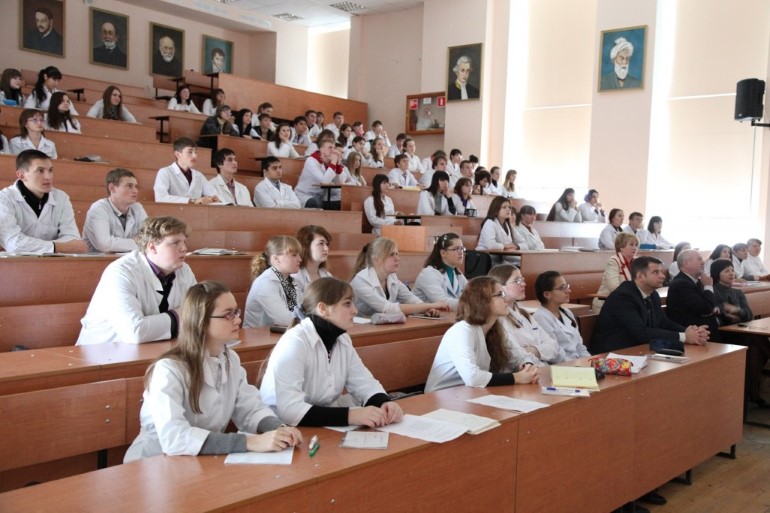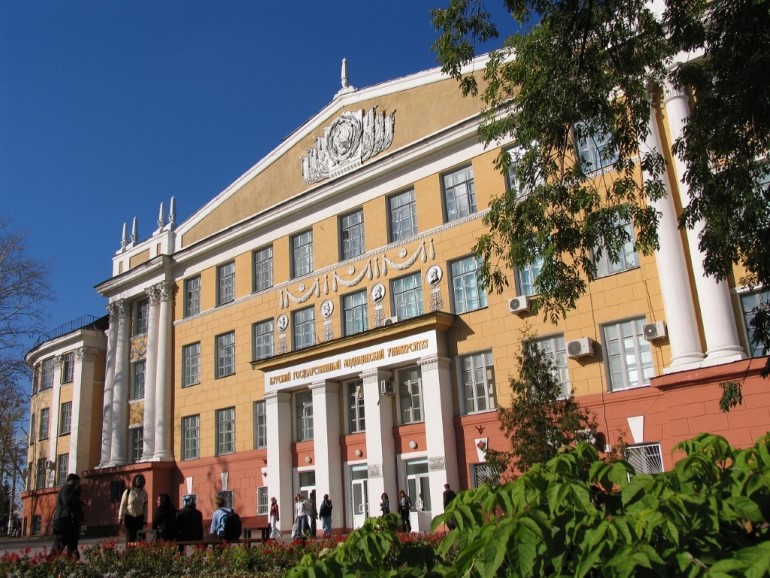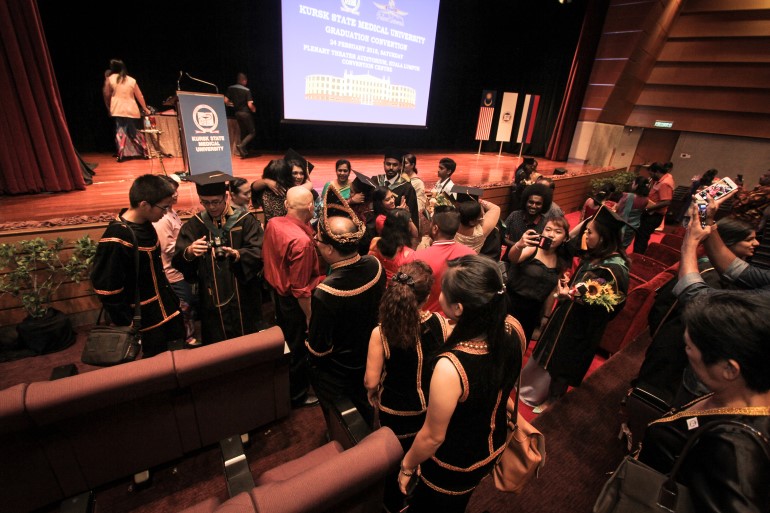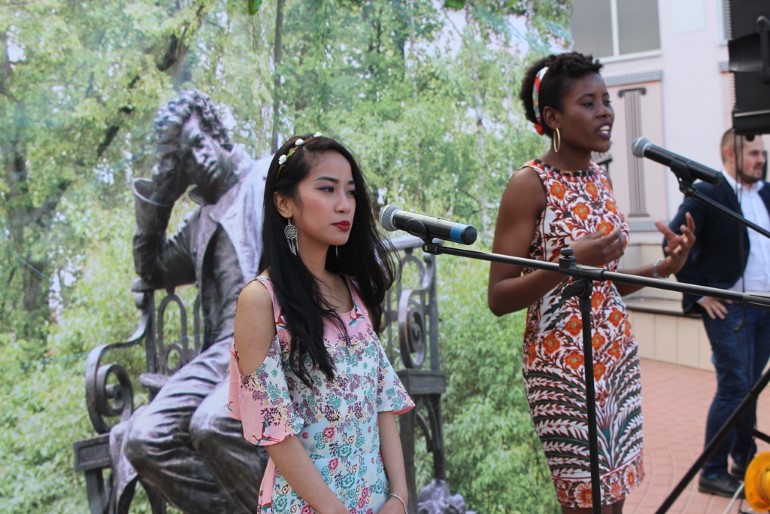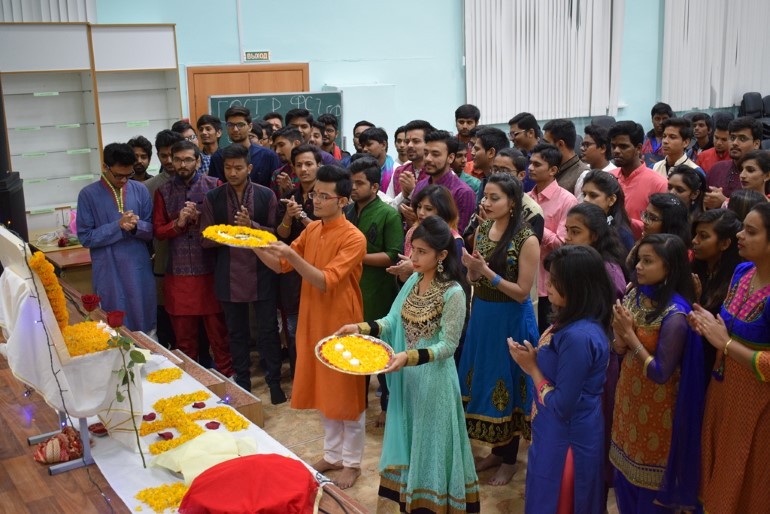Svetlana Smetanina
Universities popular with foreign students are not only the ones of Moscow and St. Petersburg. Kursk State Medical University has been teaching foreign students for nearly 30 years. It has won the fame of the most popular medical higher educational institution for students from abroad for all of these years. The Kursk State Medical University’s Rector Victor Lazarenko, tells the success story.
- Kursk State Medical University is one of the most popular medical institutions for foreign students. How did you manage to make that happen?
In 1991 our university was the first one in Russia apart from People’s Friendship University, that started teaching in English. Back then we had the first 12 students from India. Teaching in English started to attract other students. Today a half of our teachers are fluent in English.
Students of Kursk State Medical University. Picture: kurskmed.com
We had been developing partnership with North-African countries like Tunisia, Libya and Algeria before the Arabian revolutions began. We had planned to teach them in French and had even started to train teachers, but then we had to put off this idea. Moreover, we have been participating in educational exhibitions abroad, we have been meeting with heads of educational and medical departments in other countries and, thus, we have developed a strong network of contacts. Another important thing is that here in Kursk we have always had a positive attitude towards foreigners including students. The students are aware of this and appreciate it. Another factor is that the life in Kursk has always been one of the cheapest in Russia and the students who come here think it is important since they are not very rich. It is possible to rent a cheap apartment for those who don’t want to live in the students’ dormitory.
Medical education in Europe costs, at least, €10,000 -12,000, while here it is $ 2,800 per year
And, most importantly, we provide the level of education the foreign students are happy with. What does this mean? This means that our qualifications are recognized in almost all the courtiers we work with. This way or another we work with 57 countries and we are currently teaching 2,700 students from 45 countries. People know us and they want to study at our university. Eventually I tell the colleagues, we even have to stop accepting foreign students because there is literally no room from them. At the moment we have the total number of 9,000 intramural students, which makes our university the third of the fourth one in Russia on this parameter.
Building of Kursk State Medical University. Picture: kurskmed.com
- Speaking of medical institutions in other countries that also teach in English, do you compare yourself with them?
Of course, we do. Though medical education in Europe costs at least €10,000 -12,000, while here it is $ 2,800 a year. The figures are incompatible.
We are sometimes embarrassed to say that we love Russia. We don’t make a big deal out of it, while they sincerely say: “Russia gave me all that I have. It is like my mother. I love it and even see it in my dreams!"
It is important to stress that the students are content with the quality of education, most of the graduates work according to their qualifications. Not long ago I went to Malaysia, where I met with members of Kursk Medical University Graduates Association they had set up there. There is also a department of our university there, the only university of Russia. All the graduates came to the meeting in good cars, all well dressed, so one can see they live quite well. They all have surprisingly warm feelings towards Russia. We are sometimes embarrassed to say that we love Russia. We don’t make a big deal out of it, while they sincerely say: “Russia gave me all that I have. It is like my mother. I love it and even see it in my dreams!” This is all very warm and sincere. And all the people around them feel good about our country.
Meeting with members of Kursk Medical University Graduates Association in Malaysia. Picture: kurskmed.com
– How did you get the idea to open a university department in Malaysia?
We have the biggest students’ community in Malaysia, around 600 people. So we opened a preparatory department there. We accept would-be students and teach them a little Russian because Russian is compulsory as the second foreign language for our students. They have to speak the language because they start talking to patients from their third year and they need to speak fluently.
We are thinking of opening an affiliated branch of our university in Malaysia. However, it won’t be easy since such a branch has to comply with all the requirements imposed by the Ministry of Education and Science of the Russian Federation in terms of a number of departments, the facilities, the equipment. We have an idea to use a one-plus-five model, meaning that the students would study at home during their first year at the university and then would go to Russia to continue their education. In this case we could hire Malaysian teachers and send our teachers there by shifts. The local authorities are really interested in this project.
I happened to hear at an educational forum that our medical universities have the following advantage – our students do on the job training in real hospitals, while European students don’t. Is this true?
Yes, it is. We still have the Soviet system at our medical universities meaning that students are not prohibited to contact with patients. A fifth year student may give an injection or may be present at an operation or childbirth as the third assistant. It is a taboo abroad. Only a person holding, at least, a doctor’s or better a surgeon’s certificate is allowed into a surgery there. In Russia students may sit in the admission room and watch the doctors work. They may take blood for a test, measure the blood pressure, move a patient in a wheelchair or even participate in medical manipulations.
Kursk State Medical University is celebrating Pushikn's birthday. Picture: kurskmed.com
- Which specializations are the most popular with foreign students?
The most popular specializations are medical practices of different kinds, though we trained pharmacists and we still train dentists. We also give narrower specialities on request of post-graduate students. For example, if a cardiologist is need in some country he or she stays here for a year or two after graduation to gain a certain experience, like 100 hours of electrocardiogram recording, for instance. We also train PhD in Medicine, with 12 graduates having already received the degree.
- Where, apart from Malaysia, do your students come from?
Today the top countries are India, Malaysia, Sri-Lanka, Brazil, Nigeria and Thailand, with the later having the biggest students’ community in Russia, about 100 students. We have recently hosted a meeting with the Ambassador of Thailand and discussed a possibility to increase the number of Thai students we could teach. They are very interested in this. Even though there is China nearby, students come to us. As they explain the level of the acquired skills here is absolutely different, so they are willing to travel a longer distance and pay three times as much. Our graduates find a job in no time. Our training methods make it possible.
- If we compare the qualifications with those of European universities, is there a difference?
Our teaching methods are in no way worse. The training is even more intense here, because in Western countries graduates have to spend several years doing post-graduate training. We release specialists who can provide an initial consultation after six years of training. No other country in the world does this.
Indian holiday Maha Navaratri in Kursk State Medical University. Picture: kurskmed.com
- When it comes to the scientific research conducted at the university, does it attract students?
I have just opened the annual students’ conference hosting the representatives of 18 universities and 28 cities including Donetsk and Lugansk. There has been an obligatory scientific workshop in English at the conferences for the last few years. We have had both foreign students and the students from other Russian universities, like those from Voronezh and Volgograd.
We also have a students’ laboratory, which I literally dragged some foreigners into. There is the students’ scientific society. I also insisted that all our scientific societies had foreign members. After visiting once or twice they bring their foreign friends. As a result, there are societies where a half of the members are Russians, the other half are foreigners. We are trying to make our students work together irrespective of their country of origin or the colour of their skin.
We host the Malaysian Olympics, i.e. we invite Malaysian students, who study at other medical institutions. Last year they all gathered at our ground and competed in ten different kinds of sports. Next Saturday we are going to celebrate Sri-Lanka’s Independence Day. Such events usually attract more Russian students and teachers than foreign ones. All this combined creates the special inviting atmosphere of our university.
I’d like to add that foreign students are often more motivated than ours. Until they understand how to do the cardiogram they won’t let the teacher go. Sometimes teachers even complain that they have to work late because the students won’t let them go.
Two foreigners work as teaching assistants after graduation at our university. 3-4 specialists from abroad, work in the central and regional hospitals – they have stayed here after finishing the university. The Deputy Minister of Public Health in Afghanistan is a student of mine. The Healthcare Department of the biggest state in Malaysia is also chaired by our graduate. The President of one of Beirut’s Universities in Lebanon is our graduate. The chief nephrologist in Lyon is also our former student. The graduates of Kursk State Medical University work in England as well as in the U.S., so, basically, all over the world.

